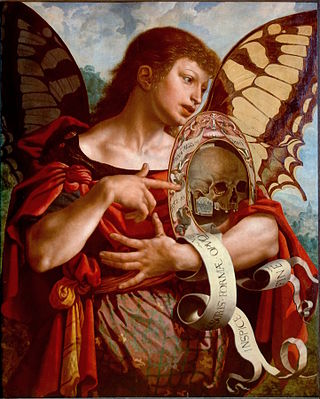The Parable of the Prodigal Son is a parable of Jesus in the Bible.
The Prodigal Son or Prodigal Son may also refer to:
Pygmalion or Pigmalion may refer to:

Daniel-François-Esprit Auber was a French composer and director of the Paris Conservatoire.

The Parable of the Prodigal Son is one of the parables of Jesus in the Bible, appearing in Luke 15:11–32. In Luke 15, Jesus tells this story, along with those of a man with 100 sheep and a woman with ten coins, to a group of Pharisees and religious leaders who criticized him for welcoming and eating with tax collectors and others seen as sinners.
Solitaire may refer to:
Doctor or The Doctor may refer to:
The Last Supper refers to the last meal that Jesus Christ took with his disciples.
Defender(s) or The Defender(s) may refer to:

L'enfant et les sortilèges: Fantaisie lyrique en deux parties is an opera in one act, with music by Maurice Ravel to a libretto by Colette. It is Ravel's second opera, his first being L'heure espagnole. Written from 1917 to 1925, L'enfant et les sortilèges was first performed in Monte Carlo in 1925 conducted by Victor de Sabata.

Jan Sanders van Hemessen was a leading Flemish Renaissance painter, belonging to the group of Italianizing Flemish painters called the Romanists, who were influenced by Italian Renaissance painting. Van Hemessen had visited Italy during the 1520s, and also Fontainebleau near Paris in the mid 1530s, where he was able to view the work of the colony of Italian artists known as the First School of Fontainebleau, who were working on the decorations for the Palace of Fontainebleau. Van Hemessen's works show his ability to interpret the Italian models into a new Flemish visual vocabulary.
A Midsummer Night's Dream is a 1595 play by William Shakespeare.
Lost Son or The Lost Son may refer to:
The Prodigal is a 1955 epic biblical film.

The Prodigal Son is an oratorio by Arthur Sullivan with text taken from the parable of the same name in the Gospel of Luke. It features chorus with soprano, contralto, tenor and bass solos. It premiered in Worcester Cathedral on 10 September 1869 as part of the Three Choirs Festival.
L'enfant prodigue is a grand opera in five acts composed by Daniel Auber to a French libretto by Eugène Scribe based on the Parable of the Prodigal Son in Chapter 15 of the Gospel of Luke. It was first performed at the Théâtre de l'Académie Nationale de Musique in Paris on 6 December 1850. The role of Azaël was sung in the premiere by the celebrated French tenor, Gustave-Hippolyte Roger, (1815-1879).
Les Rendezvous is a plotless one-act ballet created in 1933, with choreography by Frederick Ashton to the music of Daniel Auber arranged by Constant Lambert and with designs by William Chappell. It was the first major ballet created by Ashton for the Vic-Wells company.

André Alphonse Toussaint Wormser was a French Romantic composer.
Ondine is a variation of undine, the category of elemental beings associated with water
The Return of the Prodigal Son is a parable of Jesus in the Bible.

Fides Belza Cuyugan-Asensio is a Filipino coloratura soprano, director, librettist, TV host, translator, and teacher.

L'enfant prodigue is a French ballet-pantomime created in 1812 by Pierre Gardel and first performed at the Opéra de Paris.